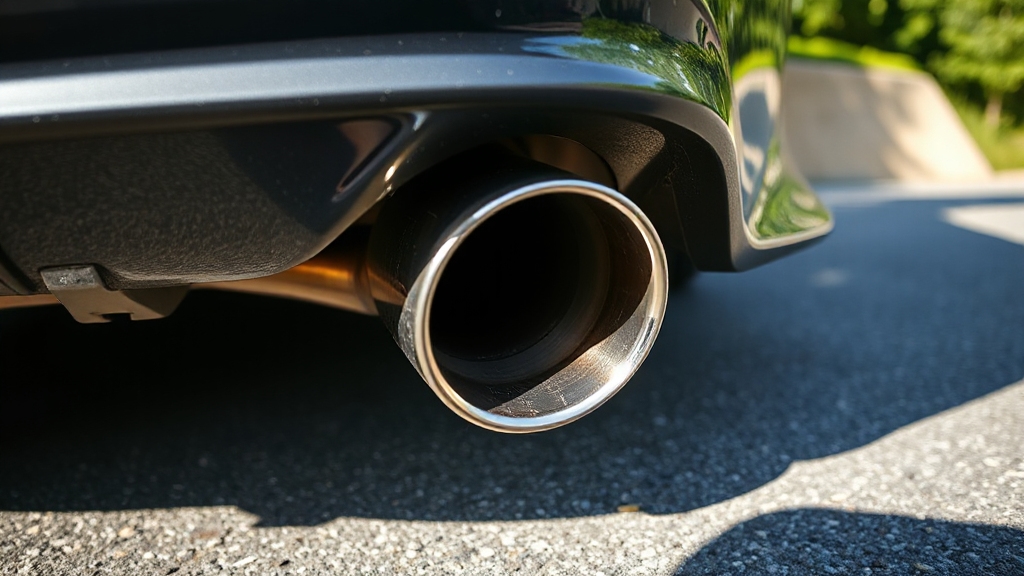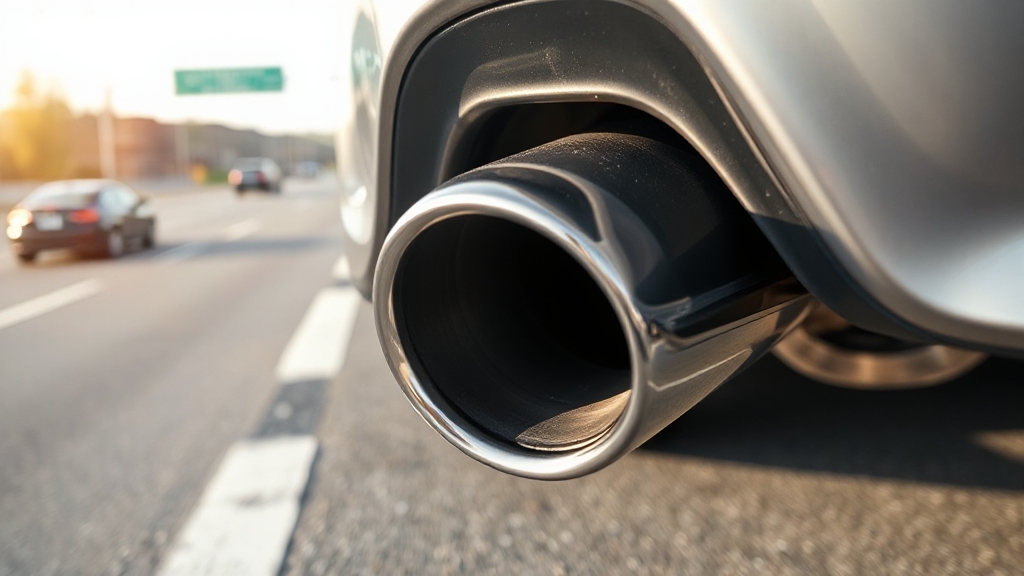If you remove your muffler, you’ll alter exhaust backpressure, which can subtly affect gas mileage. Typically, less backpressure may improve high-end power and slightly boost fuel efficiency, but it can reduce low-end torque and efficiency if not optimized. Results vary by vehicle, driving style, and required engine tuning. Damaged mufflers can also increase fuel use, so condition matters. Understanding these factors can help you assess how a muffler delete might impact your efficiency and performance.
Key Takeaways
- Muffler deletes reduce exhaust backpressure, potentially improving high-RPM horsepower but may harm low-end torque and efficiency.
- Removing the muffler can increase gas mileage by allowing freer exhaust flow, with some drivers reporting noticeable MPG gains.
- Fuel economy improvements vary widely based on vehicle type, driving habits, and whether the ECU is retuned post-deletion.
- Excessive backpressure reduction from muffler deletion can sometimes decrease fuel efficiency by disrupting optimal exhaust scavenging.
- Legal and environmental restrictions often prohibit muffler removal, and benefits depend on balancing noise, emissions, and performance goals.
How Mufflers Influence Fuel Consumption?

Although mufflers are often associated with noise reduction, they play a critical role in regulating exhaust backpressure, which directly impacts your engine’s workload and fuel consumption.
When backpressure increases—due to a damaged or clogged muffler—your engine must exert more effort to expel exhaust gases, therefore consuming more fuel.
Most vehicles have restrictive factory exhaust systems for noise and cost reasons, which can be improved by installing high-quality aftermarket mufflers. Selecting a muffler that balances performance and filtration is essential, much like choosing the right air intake system.
Conversely, optimized muffler designs reduce backpressure, enhancing fuel efficiency by up to 12%. The internal structure, particularly the number of baffles, is key; more baffles increase backpressure and decrease fuel economy.
A well-functioning muffler balances backpressure to maintain efficient exhaust flow, promoting better combustion and reduced fuel usage. Hence, maintaining or upgrading your muffler can considerably influence fuel consumption through precise control of exhaust dynamics. This improvement in exhaust flow can lead to a 2-10% increase in overall vehicle fuel economy.
Impact of Muffler Deletion on Engine Performance
When you remove the muffler, exhaust gases exit more freely, reducing backpressure and potentially enhancing engine efficiency at higher RPMs. This decrease in backpressure improves exhaust flow, which can slightly increase horsepower and torque at elevated engine speeds. Filters with higher filtration efficiency can indirectly support this by maintaining cleaner intake air, improving overall engine performance.
However, you should know that excessive backpressure reduction may disrupt exhaust scavenging, negatively affecting combustion efficiency and low-end torque. As a result, you might experience diminished initial acceleration and drivability, especially in naturally aspirated engines.
The power band often shifts upward, favoring high-end performance rather than low-speed responsiveness. To optimize these effects, retuning your ECU is advisable, as it helps maintain proper air-fuel ratios and timing. Additionally, modern engines might require reprogramming or tuning to optimize exhaust flow after deletion to prevent potential engine wear.
Real-World Gas Mileage Changes After Muffler Removal

Since muffler removal alters exhaust flow dynamics, you might observe changes in your vehicle’s gas mileage, though results vary widely. Some drivers report improvements from 18 to 21 MPG in everyday use, and highway figures with technologies like MDS rising from 25 to over 30 MPG post-delete.
However, it is important to remember that excessive backpressure can reduce horsepower and overall engine efficiency, which may counteract any fuel economy benefits. Additionally, factors such as material durability of exhaust components can influence long-term performance.
Muffler removal can change gas mileage, with some drivers seeing improvements from 18 to 21 MPG in daily driving.
However, these gains depend heavily on vehicle type, driving style, and whether the ECU is reset or tuned after removal. Weight reduction contributes negligibly to fuel economy.
Improved exhaust flow can enhance combustion efficiency by reducing backpressure, but if not matched with proper engine management, it may also decrease MPG. Real-world outcomes fluctuate due to these variables.
As a result, while you may see minor improvements, expect inconsistent results and consider that driving habits and tuning adjustments considerably influence fuel efficiency after a muffler delete.
Maintenance and Condition of Mufflers Affecting Efficiency
Proper maintenance and the condition of your muffler directly impact your vehicle’s fuel efficiency. A damaged or clogged muffler increases backpressure, forcing your engine to work harder and consume more fuel.
Cracks, leaks, and rust degrade the muffler’s ability to efficiently manage exhaust gas flow, disrupting ideal combustion and reducing fuel economy. Like advanced radar detectors that rely on precise signal filtering to ensure performance, a muffler must maintain optimal function to prevent efficiency losses.
Neglecting maintenance accelerates wear, leading to elevated emissions and decreased power output. Regular inspections prevent systemic exhaust issues and maintain backpressure within design parameters, preserving engine performance.
Additionally, the muffler plays a crucial role in reducing engine noise while managing exhaust gases. Environmental factors such as humidity and temperature can influence muffler lifespan, much like how external conditions impact radar detector reliability.
Environmental factors like humidity and temperature also affect muffler longevity, so timely repairs or replacements using high-quality materials are essential. By ensuring your muffler functions correctly, you optimize exhaust removal and backpressure regulation, which directly enhances fuel efficiency and reduces operational costs.
Taking a proactive approach to maintenance is comparable to choosing the right false alert filtering technology in radar detectors to achieve optimal results.
Considerations for Choosing a Muffler Delete Modification

Although muffler deletes can alter your vehicle’s exhaust characteristics, choosing this modification requires careful evaluation of fuel efficiency impacts, legal constraints, performance changes, and system compatibility.
You must consider that removing the muffler may reduce fuel economy benefits by 2-10%, while legal restrictions often prohibit such modifications due to noise and emissions regulations. Performance gains are typically modest and depend on your vehicle’s exhaust design and backpressure needs.
Additionally, some vehicles with more advanced exhaust technologies may experience different effects from a muffler delete. Additionally, driving habits play a significant role in how much your gas mileage is affected after a muffler delete.
| Factor | Key Consideration |
|---|---|
| Fuel Efficiency | Variable impact; dependent on driving style |
| Legal Compliance | Varies by jurisdiction; risks fines/inspections |
| Performance & Noise | Increased sound; slight acceleration gains |
Evaluate these aspects thoroughly before opting for a muffler delete.
Frequently Asked Questions
Is Muffler Delete Legal in All States or Countries?
You can’t assume muffler delete is legal everywhere. Laws vary by country, state, and even local areas, mainly due to noise pollution regulations.
Many places set maximum decibel limits, and deleting your muffler often exceeds those, making it illegal. You’ll need to check specific regulations where you live before modifying your exhaust.
Ignoring this can lead to fines, failed inspections, or orders to reinstall the muffler to comply with the law.
How Does Muffler Delete Affect Vehicle Noise Levels?
When you remove your muffler, expect a significant boost in exhaust noise because you eliminate sound absorption and dampening. This raises sound levels sharply, creating a louder, more aggressive engine tone.
Without the muffler’s interference, sound waves aren’t canceled, so noise intensity spikes, often reaching uncomfortable or illegal levels. The exhaust note shifts to a deeper, raspier quality, while noise fluctuations with engine RPM become more pronounced, altering your vehicle’s acoustic profile.
Can Muffler Delete Trigger a Check Engine Light?
Imagine your car’s check engine light as a vigilant sentinel—usually, a muffler delete won’t rouse it since mufflers mainly reduce noise, not alter critical sensors.
However, if your vehicle has active exhaust valves or integrated electronics, removing the muffler might disrupt sensor communication, triggering error codes like U113F or U1140F.
Does Muffler Delete Impact Vehicle Resale Value?
You should know that a muffler delete typically lowers your vehicle’s resale value. It signals aggressive modification, deterring mainstream buyers who prefer stock conditions.
Plus, it may violate noise and emission regulations, complicating inspections and sales. This reduces market demand and forces price negotiations.
To preserve value, consider reinstalling the OEM muffler before selling or use reversible modifications. Transparency about changes can also help, but overall, expect a narrower buyer pool.
Are There Warranty Risks With Muffler Delete Modifications?
When you remove your muffler, you’re walking on thin ice regarding warranty coverage. Manufacturers often see muffler deletes as tampering with emissions or exhaust systems, which can void your warranty completely.
Even unrelated repairs might be denied if mods are detected. Dealers typically refuse service on modified vehicles, and you may need to restore your exhaust to factory specs before any warranty claim.
Understanding terms beforehand helps you avoid costly surprises.
Fuel Savings vs. Side Effects: The Final Verdict
If you’re thinking about a muffler delete to boost gas mileage, keep in mind it’s not always a clear-cut win. While removing the muffler can reduce backpressure and slightly improve efficiency, the gains often come with trade-offs in noise and emissions. It’s a classic case of weighing pros and cons before you jump the gun. Make sure you analyze your vehicle’s specifics and maintenance status to make an informed decision.




